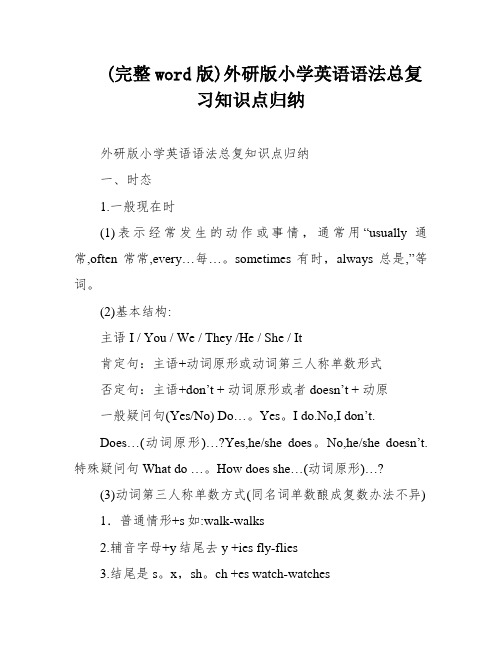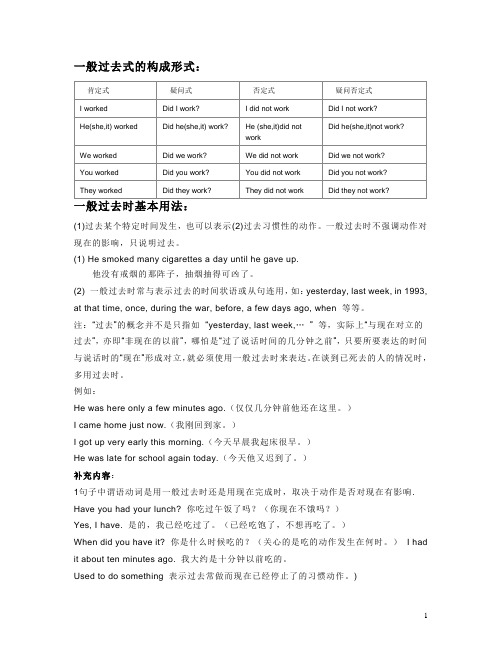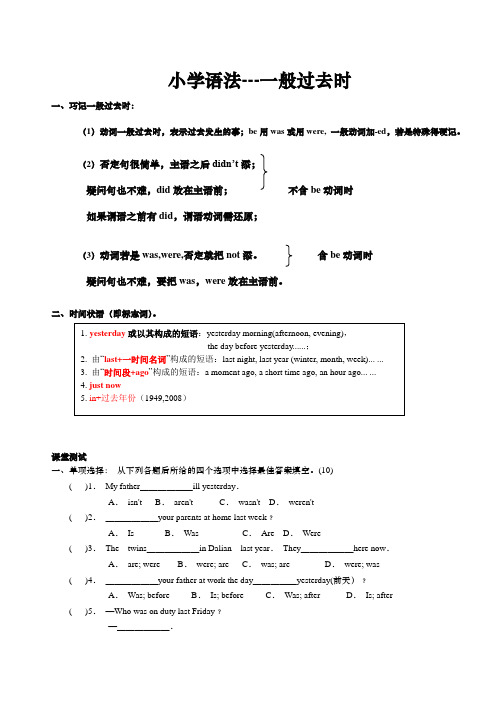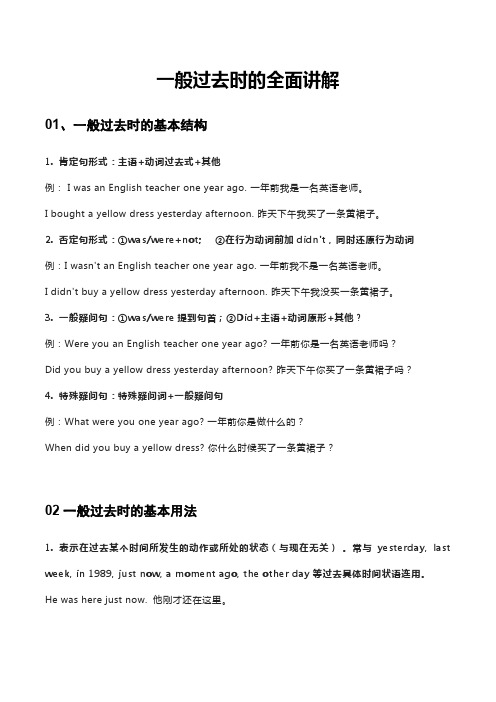(完整word版)一般过去式疑问句否定句讲解与练习
- 格式:doc
- 大小:39.01 KB
- 文档页数:2

(完整word版)外研版小学英语语法总复习知识点归纳外研版小学英语语法总复知识点归纳一、时态1.一般现在时(1)表示经常发生的动作或事情,通常用“usually通常,often常常,every…每…。
sometimes有时,always总是,”等词。
(2)基本结构:主语I / You / We / They /He / She / It肯定句:主语+动词原形或动词第三人称单数形式否定句:主语+don’t + 动词原形或者doesn’t + 动原一般疑问句(Yes/No) Do…。
Yes。
I do.No,I don’t.Does…(动词原形)…?Yes,he/she does。
No,he/she doesn’t.特殊疑问句What do …。
How does she…(动词原形)…?(3)动词第三人称单数方式(同名词单数酿成复数办法不异)1.普通情形+s如:walk-walks2.辅音字母+y结尾去y +ies fly-flies3.结尾是s。
x,sh。
ch +es watch-watches4.结尾是0 +es do-does。
go-goes5.特殊have-has2.现在进行时(1)表示正在发生的动作,通常用“now现在。
look看,XXX听”.(2)根本方式: be +动词-ingeg: I am(not) XXX.You/We/They are(not) reading。
He/She/It is(not) eating.What are you doing。
Is he reading?(3)动词的目前分词方式(动词+ing)普通情形+ing walk—walking末端是不发音的e-e+ingcome—coming重读闭音节双写末了一个字母+ingswim-swimming。
run-running3.一般过去时(1)表示过去已经发生的事情,通常用“last …上一个…。
just now刚才,many years ago许多年前,XXX昨天”等词。

一般过去时一、一般过去时的简介:定义:表示过去某时发生的动作或存在的状态.结构:“主语+动词的过去式”用法:1。
表示过去某个时间发生的动作或存在的状态。
He was here yesterday.I got up at seven yesterday morning.My mother was at work yesterday afternoon.Did you have a good time last summer?2。
表示过去经常或反复发生的动作。
My mother often went to work by taxi last year.When I was a student, I often listened to music.3。
常与一般过去时态连用的时间有:at that time, then, at that moment, yesterday, yesterday morning (afternoon, evening…)last night (week, month, year…),一段时间+ago(several days ago), two days ago, a week ago, three years ago…in 1990,(in 1997…) ,just now, long before, long long ago二. 动词过去式构成规则1、一般在动词原形末尾加– edhelp → helped, look → looked, play → played, work → worked, listen → listened, wash →washed, clean → cleaned,2、结尾是 e 的动词加 -- dlive--—lived hope———hoped use-—-used like ——- liked3、末尾只有一个辅音字母的重读闭音节,先双写这个辅音字母,再加-ed。

一般过去式的构成形式:(1)过去某个特定时间发生,也可以表示(2)过去习惯性的动作。
一般过去时不强调动作对现在的影响,只说明过去。
(1) He smoked many cigarettes a day until he gave up.他没有戒烟的那阵子,抽烟抽得可凶了。
(2) 一般过去时常与表示过去的时间状语或从句连用,如:yesterday, last week, in 1993, at that time, once, during the war, before, a few days ago, when 等等。
注:“过去”的概念并不是只指如“yesterday, last week,…”等,实际上“与现在对立的过去”,亦即“非现在的以前”,哪怕是“过了说话时间的几分钟之前”,只要所要表达的时间与说话时的“现在”形成对立,就必须使用一般过去时来表达。
在谈到已死去的人的情况时,多用过去时。
例如:He was here only a few minutes ago.(仅仅几分钟前他还在这里。
)I came home just now.(我刚回到家。
)I got up very early this morning.(今天早晨我起床很早。
)He was late for school again today.(今天他又迟到了。
)补充内容:1句子中谓语动词是用一般过去时还是用现在完成时,取决于动作是否对现在有影响. Have you had your lunch? 你吃过午饭了吗?(你现在不饿吗?)Yes, I have. 是的,我已经吃过了。
(已经吃饱了,不想再吃了。
)When did you have it? 你是什么时候吃的?(关心的是吃的动作发生在何时。
)I had it about ten minutes ago. 我大约是十分钟以前吃的。
Used to do something 表示过去常做而现在已经停止了的习惯动作。

一般过去式(一)一般过去时的概念一般过去时用来表示过去某一时间内发生的动作或存在的状态以及过去习惯性、反复性的动作。
谓语动词要用动词的过去式,常和表示过去的时间状语连用,如yesterday昨天、last night昨晚、last week上周、last year去年,等。
(二)一般过去时的结构(可分三类不同的结构)1.Be动词的一般过去时am is 的过去式为was; are的过去式为were肯定句式:主语+ was /were+ 其它.否定句式:主语+ was/were + not + 其它.一般疑问句:was/were+ 主语+ 其它?2.实义动词的一般过去时态肯定句要使用动词的过去式,否定句和疑问句要使用助动词do 和does 的过去式did.肯定句式:主语+ 动词(过去式)+ 其它否定句式:主语+ didn’t(did not)+ 动词(原形)+ 其它一般疑问句:Did + 主语+ 动词(原形)+ 其它【do , does的过去时均为did】?注:(1)did和didn’t是构成一般过去时的助动词,其特点是要在其后跟动词的原形。
(2)实意动词do的一般过去时I do my homework every day.(用yesterday改写句子)I did my homework yesterday.I didn’t do my homework yesterday.(否定句)Did you doyour homework yesterday?Yes ,I did. /No, I didn’t.(一般疑问句)3. 情态动词的一般过去时态肯定句式:主语+ 情态动词+ 其它否定句式:主语+ 情态动词+ not + 其它.一般疑问句:情态动词+ 主语+ 其它?注:情态动词的过去式:can→could , may→might , must→must ,will-would,should-should。

小学语法---一般过去时一、巧记一般过去时:(1)动词一般过去时,表示过去发生的事;be用was或用were, 一般动词加-ed,若是特殊得硬记。
(2)否定句很简单,主语之后didn’t添;疑问句也不难,did放在主语前;不含be动词时如果谓语之前有did,谓语动词需还原;(3)动词若是was,were,否定就把not添。
含be动词时疑问句也不难,要把was,were放在主语前。
二、时间状语(即标志词)。
1.yesterday或以其构成的短语:yesterday morning(afternoon, evening),the day before yesterday......;2. 由“last+一时间名词”构成的短语:last night, last year (winter, month, week)... ...3. 由“时间段+ago”构成的短语:a moment ago, a short time ago, an hour ago... ...4. just now5. in+过去年份(1949,2008)课堂测试一、单项选择:从下列各题后所给的四个选项中选择最佳答案填空。
(10)( )1.My father______ill yesterday.A.isn't B.aren't C.wasn't D.weren't( )2.______your parents at home last week﹖A.Is B.Was C.Are D.Were( )3.The twins______in Dalian last year.They______here now.A.are; were B.were; are C.was; are D.were; was ( )4.______your father at work the day_____yesterday(前天)﹖A.Was; before B.Is; before C.Was; after D.Is; after ( )5.—Who was on duty last Friday﹖—______.A.I am B.I was C.Yes, I was D.No, I wasn't ( )6. I cleaned my classroom ___________.A with three hoursB three hours agoC in three hoursD three hours before( ) 7. I came _______ my house two days ago .A back onB back toC to backD back( ) 8 . ___________? He did some reading at home.A What does your father do yesterday eveningB What does your brother do in the schoolC What did your brother do over the weekendD Where did your brother go last Sunday二、请用正确动词形式填空。

一般过去时的全面讲解01、一般过去时的基本结构1. 肯定句形式:主语+动词过去式+其他例: I was an English teacher one year ago. 一年前我是一名英语老师。
I bought a yellow dress yesterday afternoon. 昨天下午我买了一条黄裙子。
2. 否定句形式:①was/were+not; ②在行为动词前加didn't,同时还原行为动词例:I wasn't an English teacher one year ago. 一年前我不是一名英语老师。
I didn't buy a yellow dress yesterday afternoon. 昨天下午我没买一条黄裙子。
3. 一般疑问句:①was/were提到句首;②Did+主语+动词原形+其他?例:Were you an English teacher one year ago? 一年前你是一名英语老师吗?Did you buy a yellow dress yesterday afternoon? 昨天下午你买了一条黄裙子吗?4. 特殊疑问句:特殊疑问词+一般疑问句例:What were you one year ago? 一年前你是做什么的?When did you buy a yellow dress? 你什么时候买了一条黄裙子?02一般过去时的基本用法1. 表示在过去某个时间所发生的动作或所处的状态(与现在无关)。
常与yesterday, last week, in 1989, just now, a moment ago, the other day等过去具体时间状语连用。
He was here just now. 他刚才还在这里。
What did you do yesterday? 你昨天做了什么事?2. 在过去一段时间内的经常性或习惯性动作。
一般过去时1.一般过去时的概念、结构以及用法(1)一般过去时用来表示过去某一时间内发生的动作或存在的状态以及过去习惯性、yesterday反复性的动作。
谓语动词要用动词的过去式,常和表示过去的时间状语连用,如 last year去年,等。
昨天、last night昨晚、last week上周、动词的过去式来表◆一般过去时主要表示过去的动作或状态。
在句子中由主语+ 达。
) (一般现在时1.He walks to school.)(一般过去时 2.He walked to school.必因此原因的walk, 由于主语是第三人称单数he,例1.中的动词walks时现在式表示目前习惯性、经常性动作。
可译为“他现在经常步行上,“须加上 s”学”。
是过去式,过去式是叙述过去事情的动词形式,所以这句话时walked例2.中的动词“他曾经这句可译为表示的是过去的某时,例如昨天、上周或学生时代等过去的某一时间,步行上学”。
)一般过去时的几种结构(2动词的过去式1.bewas 的过去式是am与iswere的过去式是are 动词的过去时的句型如下:be(was were)~ 动词的过去式肯定句:主语+be ?+ not ~ was, were)主语+ be动词的过去式(否定句:??+ 主语~ be疑问句:动词的过去式(was, were)?他昨天很忙。
) ○He was busy yesterday. (肯定句○He was not busy yesterday. (否定句) 他昨天不忙。
) 疑问句他昨天忙吗?○Was he busy yesterday? ( )be动词过去时的肯定句1(麦克去年在美国。
Mike was in the United States last year.7/ 1ar, There is (are ) 的句型用于一般过去时需把is be 动词的现在式和过去式:变为它们的过去式:There was (were) …e)be动词过去式的否定句(2 他去年不在加拿大。
一般过去时旳练习句子变化形式(一)一般过去时旳一般疑问句(1)1.把 was, were放在句首, 其他位置不变。
由Was…? 引导旳一般疑问句, 肯定答为: Yes,… was.否认回答为: No,…wasn’t;由Were…?引导旳一般疑问句, 肯定回答为: Yes,…were.否认回答为: No,…weren’t.如:She was happy yesterday.---Was she happy? Yes, she was.(肯定回答) No, She wasn’t(否认回答)(2)They were in Li Yan’s home last night.(3)---Were they in Li Yan’s home last night?-Yes, they were.(肯定回答)--No, they weren’t(否认回答)2.在行为动词旳句子中, 要用助动词did 来引导, 其他旳语序不变。
要注意旳是, 要把行为动词旳过去式改为原形。
肯定回答为: Yes,…did;否认No,…didn’t.如: John played computer games last night.---Did John play computer games last night?Yes, he did. No,he didn’t(二)一般过去时旳否认句1.在表达过去存在旳状态旳句子中, 相接在was, were旳背面加上not。
如:(1)He was in the park last Sunday.He was not in the park last Sunday.(2) We were busy last week.We were not busy last week.2.在表达过去旳时间发生旳动作旳句子中, 要在行为动词旳前面加助动词didn’t.然后把过去式旳行为动词改为动词原形。
即: didn’t+ 动词原形。
初中英语语法:八种时态详解与练习一.概念:英语中表示不同时间发生的动作或存在的状态,需用不同的动词形式表示,这种不同的动词形式称为时态。
二.种类:(基本时态)一般现在时一般过去时现在进行时过去进行时一般将来时过去将来时现在完成时过去完成时一般现在时一、概念:经常、反复发生的动作或行为及现在的某种状况。
二、常搭配的时间状语:always, usually, often, sometimes, every week (day, year, month…), once a week,on Sundays, etc.三、基本结构①be动词(is,am,are);②行为动词(主语是第三人称单数时谓语动词要加s或es外) 否定形式:①am/is/are+not;②此时态的谓语动词若为行为动词,则在其前加don't,如主语为第三人称单数,则用doesn't,同时还原行为动词。
一般疑问句:①把be动词放于句首;②用助动词do提问,如主语为第三人称单数,则用does,同时,还原行为动词。
例句:I go to school at 6 every morning. 每天早上我七点去上学。
Summer follows spring. 春天之后是夏天。
I learned that the earth goes around the sun when I was in primary school. 我在小学就学过地球是围绕太阳转的。
Pride goes before a fall. 骄者必败。
四、基本用法:1) 描述当前时间内经常出现、反复发生的动作或存在的状态。
在这种情景中,句子常带有表示频率的时间状语:always , everyday , often , once a week (month , year , etc.) , sometimes , seldom , usually等等,以表示句中的动作或状态是习惯性的、经常性的。
小学英语一般过去时专项讲解、练习和参考答案一般过去时专项讲解与练习一、概念:一般过去时表示过去某一时候发生的动作或存在的状态。
常与一般过去时连用的时间状语有:yesterday; 昨天just now刚才the day before yesterday;前天⋯⋯ago ⋯⋯之前(例如:三天前 three days ago )Last ⋯⋯上一个⋯(例如:上周星期天last Sunday )in 1990在1990年(in+过去时间)二、分类(一) be 动词的一般过去时:肯定句:主语 +be 动词的一般过去时( was/were)否定句:主语+be动词的一般过去时(was/were)+not一般疑问句: be 动词的一般过去时( was/were )+主语(二) there be结构的一般过去时与be 动词的一般过去时的变化基本一致。
(三)一般动词的过去时:肯定句:主语 +动词的过去时( I laughed.)否定句:主语 +did not+ 动词原形( I didn’t laugh.)一般疑问句: Did+主语 +动词原形( Did you laugh?)三.巧记 chant动词一般过去时,表示过去发生事;be 用 was 或用 were, have,has变had;谓语动词过去式,过去时间坐标志;一般动词加 -ed ,若是特殊得硬记。
否定句很简单,主语之后didn ’ t 添;疑问句也不难, did 放在主语前;如果谓语之前有 did ,谓语动词需还原;动词若是 was,were, 否定就把 not 添。
四、习题练习(一)用动词的适当形式填空:1.He ______ (work) in that bank four years ago.2.She ______ (live) in the US last Monday.3.I ______ (see) him yesterday.4.He _______(come) to school at 6 o’clock this morning.5.The boy _______ (have) a bad cold yesterday.6.When _______ you _______ (buy) that house?7.He _______(tell) a story to his daughter yesterday.8._____ you ____ (try) to call me last night?9.What _______you _______ (buy) in the shop?I ______ (buy) a coat just now.10. The doctor ______ (get) up late this morning.11.She ________ (paint) the wall last month.12.My mother _______ (be) a worker 20 years ago.13.________ (be) you here just now?No, I ________ (be not) here.14.Why _______ your brother _______ (cry) last night?15.It ______(be) my mother’s birthday yesterday.(二)翻译下列句子:1.我上周去看爷爷和奶奶了。
课后练习
一般过去式的否定句
1.动词是Be动词时,一般过去时的否定式是在be动词后加not。
句型:主语+wasn’t/weren’t…
I was in Beijing yesterday. We were in Beijing yesterday.
否定句:I wasn’t in Beijing yesterday. We weren’t in Beijing yesterday. Exercises(练习):
( ) 1. It ____________ (not be) Ben's birthday last Friday.
A. wasn’t
B. weren’t
C. isn’t
D. aren’t
( ) 2. These men_________________ (not be) firemen a week ago.
A. wasn’t
B. weren’t
C. not be
D. aren’t
( ) 3. They _____________ (not be) in Beijing three days ago.
A. wasn’t
B. weren’t
C. not is
D. aren’t
( ) 4. It ____________ (not be) the 2nd of November yesterday.
A. wasn’t
B. weren’t
C. not are
D. aren’t
2.动词是行为动词时,一般过去时的否定式是在动词原形前加助动词did not (didn’t).句型:主语+didn’t+动词原形
I told them the news yesterday.
否定句:I didn’t tell them the news yesterday.
Exercises(练习):
1. Miss Guo ______________ (not get) up late the day before yesterday.
2. We all ______________ (not have) a good time three days ago.
3. She _____________ (not find) a beautiful butterfly just now.
4. I ____________ (not watch) a cartoon yesterday evening.
5. Her father ___________ (not read) a newspaper last night.
行为动词一般过去时的疑问式
一、一般过去式的一般疑问句:
1.有be动词时,把be动词提前
句型:Was+主语+…? / Were+主语+ … ?
There were three cups of tea on the table just now.
一般疑问句:Were there three cups of tea on the table just now?
Yes, there was. No, there wasn’t.
1. There were some oranges in the cup.(变一般疑问句)
_________ there ___________ orange in the cup?
2. It was Monday yesterday. (变一般疑问句)
_________ it Monday yesterday?
3. Mary and Mike were in Shanghai last month. (变一般疑问句)
_________ Mary and Mike in Shanghai last month.
2.动词是行为动词时,在句首加助动词did
Did+主语+动词原形+其他?
They finished their work at four.
一般疑问句:Did they finish their work at four? Yes, they did. No, they didn’t. Exercises(练习):
1._______ he ______ (go) to that morning? Yes, he _____.
2._________your brother ___________(find) some meat in the fridge(冰箱). No, he _________.
3.________ Mary _______ (read) an interesting book about history? Yes, she __________.
4.________ the students of Class Six _________(have) an English lesion the day before yesterday? No, they didn’t.
二、一般过去时的特殊疑问式
1.动词是行为动词时: 疑问词+did+主语+动词原形……?
They finished their work at four.
A B
对划线部分提问: A:What did they do at four?
B:When did they finish their work?
Exercises(练习):
1.They went to park by car yesterday.
________ _________ they __________ to park yesterday?
2.They did their homework yesterday evening.
________ did they_________ yesterday evening?
3.Her sisters flew kites in the park last Friday.
________ did her sisters _________kites last Friday?
4. I liked the red shirt in the past.
________ shirt did you ________ in the past.
2.有be动词时: 疑问词+ was/were+主语+其他?
Jack was in the classroom just now.
A B
对划线部分提问: A: Who was in the classroom just now?
B: Where was Jack just now?
1.Mary and Peter were in Beijing five days ago.
________ ________ Mary and Peter five days ago?
2.There were four teachers in the office.
_______ ________ teacher _______ there in the office?
3.He was a policeman last year.
_______ ________ he in the past?
4.Mike was a teacher in the past.
________ _________ a teacher in the past?。